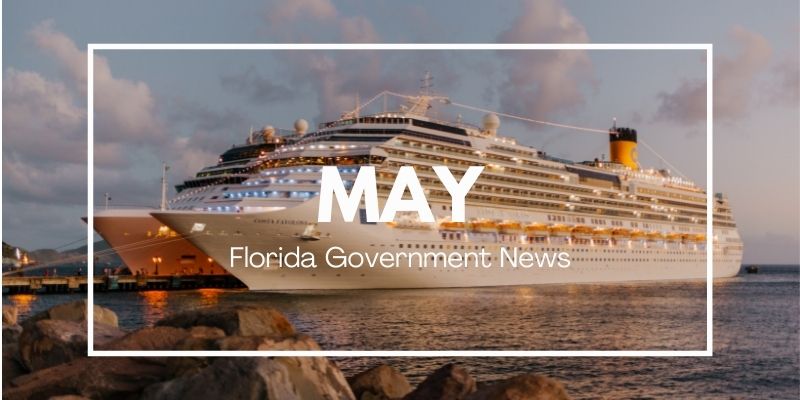
Top stories: DeSantis signs $100 billion budget; cruise ship battle continues; 30-year gambling compact signed; League of Women Voters challenge new voting law; U.S. history standards targeting critical race theory proposed
In this post, I’ll recap important state news made after the April 30 close of the legislative session, and other highlights of the month. But first, my final update on COVID-19 in the state.
COVID-19 News
Vaccinations

Forty percent of Florida residents are now fully vaccinated and 50 percent have had a least one dose, up from the 30 and 43 percent comparable figures last month. (NYTimes, 6/7/21)
Florida’s figures are comparable to the nation as a whole, in which 41 percent of residents are fully vaccinated and 51 percent have had at least one dose. (NYTimes, 6/7/21)
By age group, 88 percent of Florida residents age 65 and older, 51 percent of those age 18 – 64, and 19 percent of those age 12 – 17 have had at least one shot of the vaccine. (NYTimes, 6/7/21)
New Cases
At the end of the month, Florida stopped reporting the daily number of cases, deaths and vaccinations in the state. Instead, it will post weekly reports in a new format with condensed information on Fridays. (Miami Herald)
On May 28, in the last of its daily reports, Florida reported 2,338 new cases and a 7-day average of 2,280 new cases. (NYTimes, 6/7/21)

The current state of emergency due to the pandemic is scheduled to expire on June 26, and Governor Ron DeSantis has indicated that he does not plan to extend it. (News Service of Florida)
Policy Changes
- Florida to require ‘work search’ for unemployment benefits starting June 1. Tampa Bay Times, 5/11/21
- DeSantis says he will pardon Floridians charged with violating pandemic rules: ‘They’ve been treated poorly’. Washington Post, 5/14/21
- DeSantis withdrawing Florida from federal unemployment boost. Politico Florida, 5/24/21
The Cruise Ship Battle
In March, Gov. DeSantis forbid businesses including cruise lines to require proof of vaccinations from customers and employees. (South Florida Sun Sentinel)
In April, Attorney General Ashley Moody, backed by DeSantis, filed a lawsuit challenging the restrictions imposed by the CDC seeking to force the reopening of the state’s cruise industry. (South Florida Sun Sentinel)
U.S. government lawyers countered that Florida has no standing to sue and that the CDC, not the state, has the power to regulate cruise ships sailing from American ports. (South Florida Sun Sentinel)
A federal judge was to hear arguments in early June. (WLRN)
Post-Session Developments
Gaming Compact
In a special session held the week of May 17, the Florida legislature approved a sweeping new 30-year gambling deal negotiated by DeSantis between the State of Florida and the Seminole Tribe of Florida. (South Florida Sun Sentinel)
The deal is a win for DeSantis and for Florida’s coffers. “The breakdown of the 2010 compact has denied the state of Florida any revenue derived from the Seminole Tribe’s ongoing gaming operations,” said DeSantis in a statement. “With this new compact, the state will now see a large stream of reoccurring revenue to the tune of billions of dollars over the next few years.”
Specifically, the agreement will generate a minimum of $2.5 billion in new revenue for the state over the next five years and an estimated $6 billion through 2030, according to a DeSantis news release.
No Casinos, a group that has opposed gambling expansion in Florida before and since the 2018 vote, vowed to challenge the compact in court. In 2018, 72 percent of voters passed a state constitutional amendment that requires any expansion of gambling to go to a statewide vote. (Florida Politics)
The Tribe says the deal doesn’t require voter approval since the amendment doesn’t govern gambling on tribal land and sports betting will go through computer servers on that land. (USA Today Network-Florida)
Despite overwhelming bipartisan support in the legislature, the deal was not without its politics. According to Editorial: Shame on secretive senators for hiding gambling intentions in the South Florida Sun Sentinel, Sen. Jason Pizzo, D-Miami, asked why the compact allows the tribe to oppose a non-tribal casino only if it’s within 15 miles. “Pizzo asked this knowing that Donald Trump’s Doral country club lies precisely 15.2 miles from a casino on the tribe’s Hollywood reservation. A casino license in Miami is the answer to many of Trump’s financial problems.”
The U.S. Department of the Interior has 45 days after DeSantis signed the bill ratifying the compact to approve or reject the agreement or allow it to go into effect without the federal agency’s action. (Florida Politics)
The Budget
On June 2, DeSantis signed a $100 billion budget after vetoing $1.5 billion, including $1 billion in federal money for an emergency response fund that he said had strings attached that made it unusable. (WINK News)
The emergency fund was to have been created with American Rescue Plan money, and federal guidance requires those funds to be used to support COVID-19 response efforts, for “immediate economic stabilization,” and to address “systemic public health and economic challenges that have contributed to the unequal impact of the pandemic.” (Florida Politics)
Governor’s Vetoes
In addition to the $1 billion emergency fund, the Governor vetoed:
- $54 million in local projects. (Tampa Bay Times)
- $2 million to increase access to long-acting reversible contraception for low-income girls and women. Senate President Wilton Simpson had tucked the money into the budget, wanting to model the effort after a program in Colorado that reduced unintended pregnancies. (Florida Politics)
- $900,000 in LGBTQ support programs, including one that provides mental health services to survivors and family members of victims of the Pulse nightclub mass shooting. (WLRN.org)
For a compete list of the 2021 vetoes, click here.
New Laws
A number of measures became law with the Governor’s signature this month. They include:
- a broader ban on local governments for gun regulations — A new law makes local governments pay up to $100,000 if they are sued for imposing gun regulations. (Tampa Bay Times)
- landmark sea level rise bills — The bills represent Florida’s “most robust plan” ever to address the threats posed by future flooding, House Speaker Chris Sprowls said. (Tampa Bay Times)
- a transgender sports ban — “We believe in the state of Florida protecting the fairness and integrity of women’s athletics,” DeSantis said at the signing. He signed the bill on first day of LGBTQ Pride Month. (Orlando Sentinel)
- a law that gives developers a break on impact fees —It “makes it virtually impossible for local governments to require that new development pays its own way,” said growth-management organization 1000 Friends of Florida. (News Service of Florida)
- laws to combat Chinese influence at Florida universities — The bills were spurred by incidents of Chinese nationals working at Florida colleges stealing sensitive materials and designs of military equipment.(Orlando Sentinel)
Court Challenges Ahead
Several new laws will be challenged in the courts. Among them are challenges to laws that:
- include new restrictions on voting; challenged by the League of Women Voters of Florida, Black Voters Matter Fund, Florida Alliance for Retired Americans and several individual voters, among other lawsuits (NYTimes, The Center Square | Florida; Orlando Sentinel)
- combat “public disorder” (AKA “anti-riot” law); challenged by a coalition of Black Lives Matter of Broward County, the NAACP of Florida, and the Dream Defenders, in one lawsuit, and by the Lawyers Matter Task Force in another (NYTimes; The Capitolist)
- limit contributions to political committees backing ballot initiatives; challenged by the ACLU of Florida (News Service of Florida; South Florida Sun Sentinel)
- ban transgender girls from playing in school and college sports designated for females; challenged by the Human Rights Campaign. (NBC News; WINK News)
- stop censorship of Big Tech; challenged by NetChoice and the Computer and Communications Industry Association (News Release; USA Today)
In Other Florida Government News
Proposed New U.S. History Standards
Is “critical race theory” a way of understanding how American racism has shaped public policy, or a divisive discourse that pits people of color against white people? (What Is Critical Race Theory, and Why Is It Under Attack?, Education Week, 5/18/21)
Florida is one of several states that is seeking to ban or limit schools from teaching that racism is infused in American institutions. (NYTimes)
On June 10, the State Board of Education will consider a proposed rule that says teachers “may not define American history as something other than the creation of a new nation based largely on universal principles stated in the Declaration of Independence.” The proposal also aims to ensure teachers do not “indoctrinate or persuade students to a particular point of view” that is inconsistent with state standards. (News Service of Florida)
According to Gov. DeSantis, “(History) needs to be taught accurately, it needs to be taught in a fact-based way not an ideological-based way. If we have to play whack-a-mole all over this state stopping this critical race theory, we will do it.”
- Ron DeSantis denounces Critical Race Theory as ‘Marxism.’ (Florida Politics)
- Gov. DeSantis takes on how racial history is taught in Florida schools, (USA Today Network-Florida)
- Editorial: Corcoran, DeSantis seek to scrub history lessons of uncomfortable facts. (The Gainesville Sun)
The Florida Education Association, the state’s largest teachers union, opposes the proposed rule.
And despite the fact that School Board elections in Florida are nonpartisan:
- Ron DeSantis vows to get ‘political apparatus involved’ in Florida school board races. (Florida Politics)
Moody Loses Immigration Case
This month, a federal judge refused Attorney General Ashley Moody’s request for a preliminary injunction in an immigration lawsuit that she filed in March against the Biden administration. She quickly filed an appeal. In her lawsuit, Moody contends that the Biden administration’s directives threaten public safety in the state. (South Florida Sun Sentinel)
Fried Amends Financial Disclosures
This month, Commissioner of Agriculture Nikki Fried amended two separate financial disclosure forms, reporting earning substantially more money from her lobbying business than she initially disclosed — money that in part came from work she did on behalf of a Gainesville-based nursery that was eventually acquired by a medical marijuana company. (Politico Florida)
Then she filed to run for governor. (CNN)
After that, the chairman of the Leon County GOP filed an ethics complaint against her. And Sen. Joe Gruters, chairman of the Republican Party of Florida, called on the Florida Legislature to investigate the matter. (Florida Politics)
Judicial Branch
The Florida Supreme Court this month affirmed the state’s vertical integration medical marijuana model, essentially delivering a blow to small companies hoping to enter the state’s $1 billion-plus medical marijuana industry. (Politico Florida)
That’s it for Florida government news for May! Stay safe!
